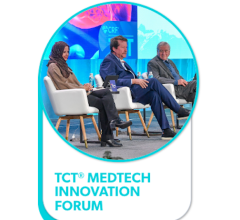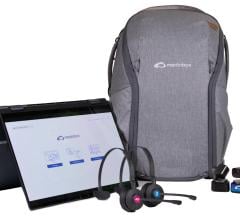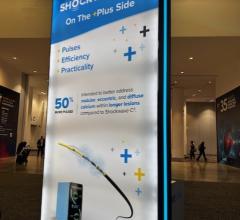
The Edwards Lifesciences Evoque transcatheter tricuspid valve replacement system demonstrated sustained favorable patient outcomes at six months in the TRISCEND study.
November 8, 2021 — Results from a clinical trial of the Edwards Lifesciences Evoque transcatheter tricuspid valve replacement system demonstrated favorable patient outcomes were sustained at six months. Results from the TRISCEND study, treating patients with tricuspid regurgitation, were presented during the late-breaking clinical science session at the 2021 Transcatheter Cardiovascular Therapeutics (TCT) annual meeting of the Cardiovascular Research Foundation.
Patients enrolled in the TRISCEND study had symptomatic, moderate or greater functional or degenerative tricuspid regurgitation (TR), despite optimal medical therapy. Following positive 30-day outcomes that were presented earlier this year, the 6-month results (n=56) demonstrated significant TR reduction by core laboratory assessment. Specifically, at 6 months:
• Significant reduction in TR severity, with 100 percent of patients with none/trace or mild TR in 43 patients with paired echocardiographic data available.
• Significantly improved functional and quality-of-life outcomes, including 89% of patients in NYHA Class I or II, and a 27-point increase in KCCQ score over baseline.
• High survival rate of 96%, and freedom from heart failure hospitalization of 94%.
"Severe tricuspid regurgitation is becoming increasingly recognized to have a significant impact on quality of life and may be a predictor of increased mortality. Unfortunately, most patients with TR are at high risk for conventional surgery and there currently are no approved transcatheter options in the US," said Susheel Kodali, M.D., Columbia University Irving Medical Center and TRISCEND Study Principal Investigator. "The six-month results that we have seen with patients enrolled in the TRISCEND study who received the Evoque tricuspid valve replacement are truly remarkable and very promising for patients who suffer from tricuspid regurgitation."
The TRISCEND study is a prospective, single-arm, multicenter study, designed to evaluate the safety and performance of the transfemoral Evoque tricuspid valve replacement system in TR. Results were reported on 132 patients enrolled, with 6-month follow-up results on 56 patients. The study continues to enroll and additional patient follow-up will take place at 1 year and annually up to 5 years. The trial endpoints are device and procedural success, a composite of major adverse events (MAEs) at 30 days and TR reduction.
"We are quite encouraged by these data, not only related to the therapy and procedural success rates demonstrated by the Evoque system, but also for the significant TR reduction and sustained improvements in quality-of-life measures experienced by patients," said Bernard J. Zovighian, Edwards' corporate vice president, transcatheter mitral and tricuspid therapies. "Our goal is to lead the transformation of treatment for this diverse and expansive population of tricuspid valve disease patients. We are committed to building a strong body of evidence to support emerging therapies like the Evoque system, which will continue with our randomized pivotal trial, TRISCEND II, currently underway."
The Evoque valve replacement system is an investigational device and is not available for sale in any country.
Links to All the TCT 2021 Late-Breaking Clinical Trials
More structural heart technology news
For more information: www.edwards.com


 October 31, 2025
October 31, 2025 









